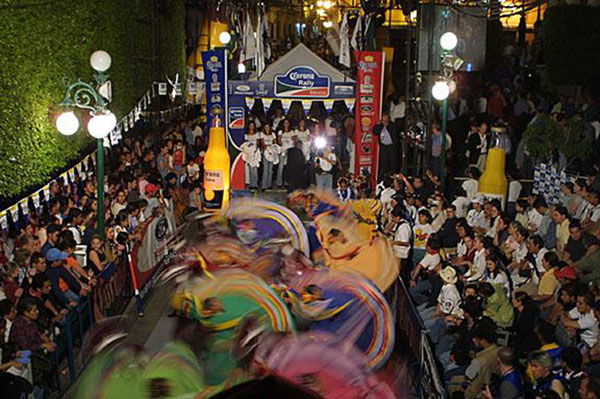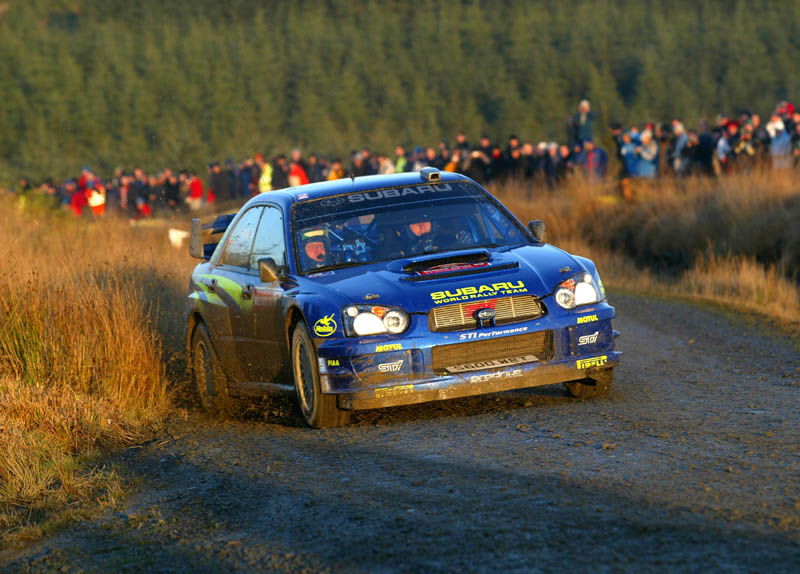WRC Ford focus - M-Sport.
Tackling a full-scale WRC campaign for a major motor manufacturer is no small undertaking. Behind the Ford WRC campaign is Malcolm Wilson's M-Sport concern. Here we have a brief look at the company and individuals behind the rally effort and their stunning headquarters.
Tackling a full-scale WRC campaign for a major motor manufacturer is no small undertaking. Behind the Ford WRC campaign is Malcolm Wilson's M-Sport concern. Here we have a brief look at the company and individuals behind the rally effort and their stunning headquarters.
Malcolm Wilson, once upon a time, was quite some rally driver himself, but for the past eight seasons he been running Ford's frontline rally effort. From the Escort WRC through to today's Focus challenger, Wilson's been the man answerable to the mighty Ford Motor Company, as well as heading up his own M Sport operation.
Wilson can look back over more than twenty years' experience and much of this was spent driving Ford's products so the provenance between team director and motor manufacturer is good. It's no back-street arches undertaking either, M-Sport has in the region of 170 employees dedicated to ensuring that the Focus RS WRC is the best car in the field.
Rallying, more so than circuit racing, is a time consuming endeavour. The WRC season starts in January and ends in November, meaning it's a good few months longer from start to finish than those F1 guys. And there is rather more than just a maximum two-hour race.
Fortunately, given this long season, the M-Sport squad can truly be said to have rallying in their blood. Wilson himself can look back on two British national titles, at the wheel of the famous rear-wheel drive Mk2 Escort, and the British international championship in 1994 at the wheel of the four-wheel drive version of the final Escort derivative.
This personal experience has been a vital factor in taking M-Sport to the position it holds today. Able to look back on the experience of having driven for three factory teams in the WRC, and having spent several years as Ford's chief test driver means that Malcolm knows at every level what it takes to push team, car and drivers to the limit and this has worked well, with M-Sport one of the world's leading private teams having won some thirteen world championship events.
Rallying seems to be a great proving ground for frontline motorsport management. Ferrari F1 lynchpin Jean Todt used to be a world class rally co-driver, for drivers including Ove Andersson - the man who masterminded Toyota's move into F1. Over at BAR there's Dave Richards, who also plays a small part in the running of both the WRC and the Prodrive concern that runs Subaru's effort.
Wilson meanwhile is content with the rally arena, and has a talented team behind him at M-Sport. Looking after the technical side of things is experienced Belgian Christian Loriaux who took the role of technical director when he joined the team at the end of 2001. Loriaux can look back on some fine work in the past; in 1998 he became chief engineer at Prodrive and was responsible for the Impreza WRC that took Brit Richard Burns to the title in 2001. The 2003 Focus represents Christian's first all-new car for M-Sport.
Wilson and M-Sport have been fortunate in having good backing from Ford, even when the results have not been what might have been desired. Sometimes motor manufacturer board members believe that just throwing money at an effort should be sufficient to ensure results, but the Ford Motor Company has such a solid motorsport history that it has been prepared to take the rough with the smooth - World Rally Championships are not won overnight.
Looking after the Ford side of things is Jost Capito, a man with rather a fine motorsport history himself. In a rather impressive resum?, he can list spells at the Sauber Formula One team, as chief operating officer, Porsche as head of Motorsport Organisation, and BMW as development engineer for their high performance engines. He's even competed himself in endurance motorcycle racing and motocross and won the truck category of the Paris-Dakar Rally in 1985.
The sheer logistics of getting everything together smoothly on an event means that somewhere in the region of 75 team members attend. There's a variety of tasks to take to, and whilst the F1 guys sometimes complain about some of the pit conditions they face, the rally guys literally create there own conditions. For instance, on Wales Rally GB, they were presented with a gravel car park, and from that a service area, technical computer centre and hospitality suite was created.
Service time, when the drivers bring back their cars from the stages in whatever condition they can, certainly gets interesting. Often repairs have to be fashioned as best possible in the twenty minutes allocated for the teams before the car, driver and co-driver depart the area. With everything bar the engine able to be changed, the team quickly gets well practiced at all aspects of motor repair and servicing and whilst they don't have to accomplish F1 style tyre changes in under 5 seconds, they can boast of a gearbox change on the four-wheel drive Ford Focus RS WRC in under 12.5 minutes.
The service area itself is the domain of Martin Wilkinson, someone like so many of the team, who has competitive rally experience himself after starting as a rally driver aged seventeen. Martin's responsibility on rallies if for the 'set-up, presentation and overall smooth operation of the WRC service areas.'
Actually getting the crew to events is the work of co-ordination manager John Millington who books the flights, ferries and accommodation as well as taking care of the small matters of fuel supply and making sure the team is actually entered in the event. All important elements of the effort. John also makes the complex movement schedule for each event and when actually there it's his task to keep track of the more that a thousand tyres that are used.
Lest anyone get injured, and in rallying driver and co-driver take more than their fair share of bumps and bangs when everything is going to plan, let alone when the car ends up going off the route. No fear in the Ford effort as there's sports therapist Emma Lowe on hand. Emma's responsible for all the team's personnel, as everyone needs to be at their peak.
The team also even has its own doctor on hand in the form of Simon Morris. Simon has probably seen rather an interesting array of ailments in his time as prior to coming to M-Sport he spent three years as the ship's doctor aboard cruise liners for P&O. Anyone remember the TV series Love Boat?
These are just some of the so many members coming together in the M Sport Ford WRC effort. There are so many more unsung heroes, without whom the team wouldn't function the way it does, and wouldn't win rallies.
Back at base, and more of the base later, a total of 166 employees are charged with the Ford rally effort, some 75 of whom uproot each time there is a rally to attend. Where these 166 people work however, warrants mention in itself.
The grandly named, appropriately grandly named as it turns out, Dovenby Hall, is the home of M Sport. Located on the edge of the world famous English Lake District, the 115 acre listed property is not where you'd first expect to find a WRC team housed.
Since May 2000, that's exactly where the M Sport team has been based, with a clever blend between the requirements of an ultra-modern rally team, and its picturesque base. Twelfth century stonework seems to mix well with the latest Centrino technology.
Where there was once a walled garden, there is now a state of the art workshop with sufficient bays to hold no fewer than twenty-two rally cars. With and R&D department and a museum on the way, the site lends itself to expansion. Clearly Malcolm Wilson knows what he wants when he points out the site's potential to have its own test track.
Next, in the final part of the series, what it was like in the build-up to the Wales Rally GB with the M Sport crew.







